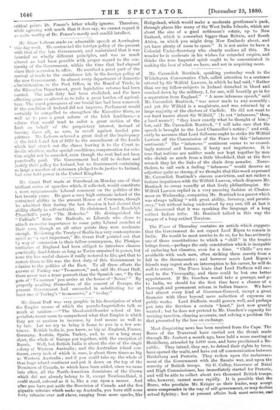Mr. Shaw Lefevre made an admirable speech at Accrington '
this day week. He contrasted the foreign policy of the present with that of the late Government, and maintained that it was founded on wholly different principles, and was as much altered as had been possible with proper regard to the con- tinuity of the Government, within the time that had elapsed since their accession to office. He ascribed, a great part of the revival of trade to the confidence felt in the foreign policy of the new Government. In almost every department of domestic . administration, in the Post Office, in the Board of Trade, in the Education Department, great legislative reforms had been carried. The malt duty had been abolished, and the laws affecting game so altered as to take a great burden off agricul- ture. The worst grievances of our burial law had been removed. If the condition of Ireland did not improve, Parliament would certainly be compelled to strengthen the Executive there, as well as to pass a great reform of the Irish land-laws,—a reform that would tend to enlist a great section of the Irish on behalf of the proprietary interest, instead of leaving them all, as now, in revolt against landed pro-, prietors. Mr. Lefevre referred a great deal of the inadequacy of the Irish Land Act of 1870 to the amendment of the Lords which had struck out the clause leaving it to the Court to decide whether, under special conditions, compensation for evic- tion might not be awarded, even though the rent had not been punctually paid. The Government had still to declare aud justify their policy for Ireland, but no Government containing so large a number of statesmen pledged to do justice to Ireland, had ever held power in the United Kingdom.


































 Previous page
Previous page